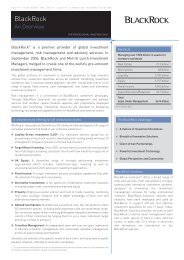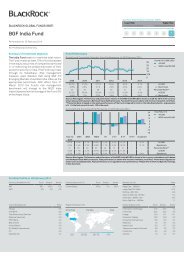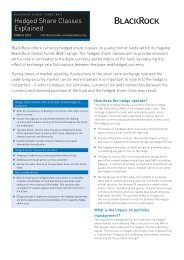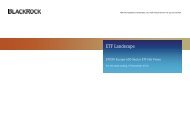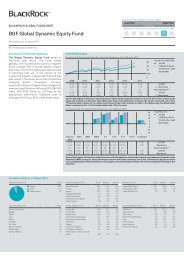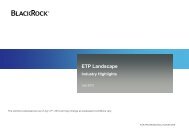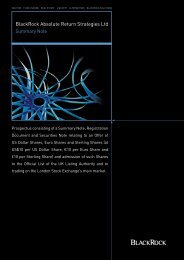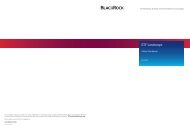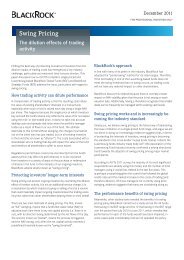Outlook for Global Wholesale and Investment Banking - BlackRock ...
Outlook for Global Wholesale and Investment Banking - BlackRock ...
Outlook for Global Wholesale and Investment Banking - BlackRock ...
Create successful ePaper yourself
Turn your PDF publications into a flip-book with our unique Google optimized e-Paper software.
March 16, 2010BanksThe key point we want to underscore is that the more we havedug into the proposed funding rules, the more we areconcerned by the implications. We believe a measuredresponse needs to be taken, in the context of restarting loangrowth in Europe. We also think a reopening of thesecuritization market as one of the best ways to fundmortgages is key <strong>for</strong> banking. It strikes us that the currentproposals – on leverage, stable funding ratios <strong>and</strong>securitization rules – make this quite unlikely in Europewithout major re<strong>for</strong>m. Also, in the UK, a market that <strong>for</strong> thelast 2.5 years we have argued has a massive mismatch, anational mortgage corporation (like that in Hong Kong) is onepossible solution.Non-banks should prosperWe think the odds are that asset managers <strong>and</strong> boutiques willblossom as the financial world is reshaped. Although there issill much flux <strong>and</strong> uncertainty ahead – <strong>and</strong> in Europeprotectionist measures such as the alternatives directivethreaten this – we think more talent <strong>and</strong> business will flow tospecialists. In the listed space, players such as Blackstone<strong>and</strong> Partners Group strike us as good ways to play thischange.Top-line pressure will mean that progress towardsexchanges <strong>and</strong> derivative clearing will take time inEuropeWe remain Underweight BME <strong>and</strong> LSE <strong>and</strong> Equal-weightDeutsche Boerse. We think brokers’ desire to use MTFs willremain high – the key risk in our view <strong>for</strong> BME – <strong>and</strong> equityvolumes are lackluster. On derivatives, we argued previouslythat clearing could be a $0.3-1.0bn opportunity <strong>for</strong> clearinghouses. At a stock level though, we see this playing out farmore intensely in the US than in Europe (note recentcomments by Fannie Mae <strong>and</strong> Freddie Mac that they intend tostart using central clearing <strong>for</strong> their interest rate swapsportfolios within months). As we argued with Oliver Wymanearlier in this report, there are many obstacles to clear inEurope, not least of which are the natural reservations on thepart of central banks to agglomeration risk. Until this isresolved, we think players such as Eurex will struggle to getthe turbo charge seen by players such as ICE, which hasbeen particularly successful in CDS business. It is alsopossible there may be more capital needed, depending onhow regulations settle.Constructive rate <strong>and</strong> FX volumes should support IDBtop line, though regulatory <strong>and</strong> competitive uncertaintyremain issuesAlthough we believe that FICC I-bank revenues may be down~26% in 2010, this chiefly speaks to the tightening in bid-askspread. We believe that volume dynamics will be reasonablyconstructive in rates <strong>and</strong> FX (given macro volatility, debtissuance etc), which offers support <strong>for</strong> the IDBs’ top line,despite weaker tailwinds from currency versus the prior year.Recently reported bid interest (FT, 10th March) in Tullett,although unconfirmed, also speaks to the potential <strong>for</strong>valuation support from private equity interest <strong>and</strong>/orconsolidation within the exchange/IDB space. That said, wesee some challenges to exchange/IDB deals, including risksof top-line attrition, execution risk (especially wherebusinesses are predominantly voice broking), <strong>and</strong> potentiallylimited cost synergies, unless IT represents a significantportion of the overall cost base.We have favoured TLPR (Overweight rated) on valuation (itwas trading at ~7x 2010e P/E prior to recently reported bidinterest) <strong>and</strong> as the vanilla skew in its business to governmentbonds, rates <strong>and</strong> FX played well to areas where we feltvolume dynamics were supportive. We recognise the longertermrisks, assuming electronic migration accelerates on theback of increased centralised clearing <strong>and</strong> straight throughprocessing of OTC derivatives, but view ICAP as betterpositioned than peers, given its stronger electronic capability.Our base case has been <strong>for</strong> regulators to m<strong>and</strong>ate clearingbut not exchange trading (see Identifying winners from marketstructure change, 15th July, 2009), but we nonetheless seewild card risks that more hawkish views within the regulatorycommunity could represent risk on this front to businesscurrently intermediated by the IDBs. Meanwhile, an uncertainregulatory environment places risks to volume recovery, in ourview, given the risk that bank trading activities could becurtailed at the margin. We view the recent profit warning byICAP as chiefly due to execution challenges on new businessinitiatives (e.g. Brazil, cash equity) which we expect renewedfocus to resolve. However, we also see pressures on corebusiness from staff retention, from a shift to lower-marginvanilla business <strong>and</strong> from intense pressure from user bankson broker commissions in a more challenged environment. Assuch, we are Equal-weight on ICAP (see also Execution <strong>and</strong>regulatory risks keep us on the sidelines, 10th Feb, 2010),<strong>and</strong> more broadly see better risk/reward among a number ofthe asset managers (SDR, HGG)35



